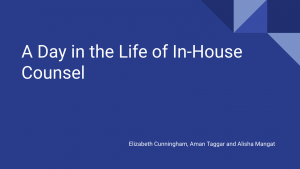Submitted by Kimberly Gee
(1) What made you choose to be in-house counsel?
I wanted to work in an environment where I had a closer relationship with a client, where I could work on complicated issues without the key consideration being the economics of legal practice (i.e. billable hours). In the First Nations context, I firmly believe that success (through the delivery of legal “tasks”) comes as the result of building a solid relationship with a community’s leadership and also its membership. And there is such complexity to the legal challenges facing First Nations that it’s critical to have a regular presence (and not just the periodic advice of a professional sitting in an office hundreds of miles away).
(2) Are there any resources specific to the in-house counsel role that you recommend?
Honestly, there aren’t any specific to in-house counsel in the First Nations context that I recommend. Lexis Nexis has some resources, but these aren’t really tailored to the work that I do. My key resources are contacts with others who work on comparable issues (whether they be in-house counsel, legal practitioners or others). For example:
- Key people in my organization
- Legal practitioners who I respect and who significant knowledge
- Organizations like the Lands Advisory Board
- Individuals in organization like Indigenous Services Canada (ISC) who may have insight on issues I’m working on.
(3) What are the best practices you would suggest for someone beginning a new role as in-house counsel?
My perspective on this issue comes from working in a First Nations context. Some considerations include:
- Ensuring you thoroughly understand the structure/dynamics of the environment you’re working in. This includes:
o Cultural environment
o Organizational structure and reporting arrangements
o Political climate
o Key community issues
o Legal structure (in the First Nations context, one has to have a full understanding of working an Indian Act context, vs FNLM or other sectoral self-government communities vs, self governing vs treatied communities).
- Ensuring that you have an understanding of the resources available to you, including:
o Key advisors within the organization
o Support personnel
o Financial resources
- Ensuring that your leadership and administration understand what you do and do not do in house. (When your leadership and/or administration assumes you can do everything in house, that is a recipe for disaster).
4) Any lessons learned respecting an approach you took but would do differently with the benefit of hindsight?
As discussed above, it’s critical to not try to do things which can’t reasonably be done in house. Similarly, one has to be conscious of workload. When you’re a regular presence, people will throw things of almost every variety at you, and you have to be forthright about what you can and can’t do. Sometimes you can’t do things because:
- The shop isn’t set up to do it (like complicated litigation)
- The workload is too great
- It’s beyond your field of expertise. In-house counsel can’t be “everything to everyone”. I’ve definitely struggled with that.
(5) What is the biggest difference you have found between working in a private law firm and working as an in-house lawyer?
They’re entirely different experiences. The key differences are that as in-house counsel:
- You have a single client and are able to build a very close relationship with that client.
- You get a much more thorough understanding of the issues and why those are critical to your client.
- You get to work with others (in an organization) who can give you a different perspective on how to approach things.
- You’re don’t have to consider billable hours (although efficiency is still a factor)
- You have more control over the organization and prioritization of your work.
(6) When working as in-house counsel for an Indigenous organization, were there any particular skills, aptitudes, challenges or opportunities that you identified as part of taking on this type of role?
Working in a First Nation community requires skills not required of those working in conventional practice or even other in-house roles. In order to truly succeed, you need to:
- Believe in the work you’re doing and the leadership you’re working for
- Understand the history of First Nation people (social, cultural, legal) and how that history informs the approach to the issues you’re working on.
- Be able to develop meaningful relationships with community members and obtain their trust so that they will share information (and ideally support the things you’re working on).
- Understand the complicated dynamic of working in an organization that includes both First Nation and non First Nation people, and the complexity (and sometimes conflict) that engenders.
- Be prepared to engage in frank and sometimes contentious dialogue so that your client (and the people they represent) consider perspectives that they might not be otherwise prepared to consider.


